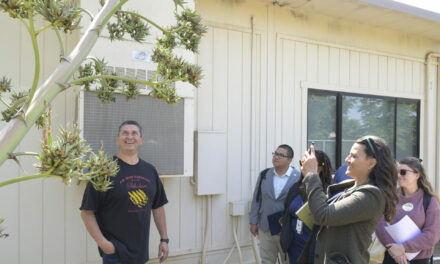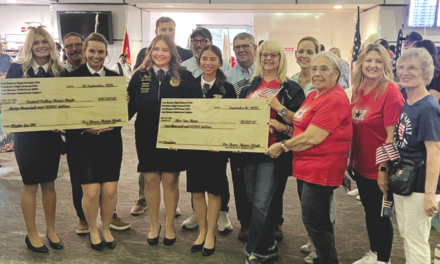With the help of a new agricultural initiative, the Central San Joaquin Valley can expect a transformation of the ag community through advancements in agricultural technology, engineering, and workforce training.
Merced College will lead the new Agri-food Technology and Engineering Collaboration (AgTEC) workforce program. A coalition of eight community colleges within the Central Valley are partnering with worker representatives to develop job training for agricultural workers in the region.
To keep up with automation and advancements in ag technology, the major goals of the program include the training of 8,400 workers over the next four years, providing an estimated 60 percent increase in wage growth, and $50 million invested for workforce development, according to Merced College documents.
A press conference announcing the program on Sept. 6 inside the Downey Learning Resource Center (the library building) on the Merced campus, attracted a large gathering of students interested in agriculture, such as diesel mechanics, welders, and those studying agricultural business and animal science. In addition, representatives of the other seven community colleges were present at the conference.
The AgTEC program is one of three parts of the Fresno-Merced Future of Food (F3) Innovation Initiative portfolio, along with the Local Farm and Food Innovation Initiative and iCREATE. The AgTEC workforce program will specialize in educating and training workers so that they may have the skills required to pursue higher paying careers within the industry.
“We know here in the Central Valley that we feed the world, and that those that are helping feed the world are the ones that are suffering the most,” said Superintendent/President of Merced College, Chris Vitelli. “We need to contribute to the workforce, the incumbent workers that are going to lose their jobs due to automation in the fields, and we need to give them the upskills they need to continue to be society-ready individuals.”
The F3 Initiative was the recipient of $65.1 million in funding through the U.S. Economic Development Administration’s Build Back Better Regional Challenge, the largest grant awarded in the nation. Of this grant, Merced College will receive more than $27 million to dedicate to workforce training as project lead.
A $15 million investment from the state, made possible by 12th State Senate District Sen. Anna Caballero, will help launch the AgTEC initiative.
“The San Joaquin Valley is one of the biggest producers of food in the world, yet our communities continue to struggle with poverty and unemployment,” Caballero said. “AgTEC provides innovation, education and training that will lead to better-paying jobs and an even more vibrant industry for our region.”
Vitelli outlined the three major outcomes of AgTEC, which included building a workforce council, developing consistent curricula, and establishing four AgTEC Workforce Innovations Centers. Vitelli explained that building a “regionwide industry workers workforce council” will establish what must be done to train future ag technicians to contribute to the ag food value chain.
Developing a uniform curriculum for ag technicians and engineers and ensuring every campus has consistent equipment and technology across all eight community colleges will prepare workers equally with industry-recognized skills. The curricula are going to be responsive to the skills incumbent workers already know, Vitelli noted.
Vitelli said the AgTEC program will benefit the Westside, including Los Banos, Dos Palos, and Firebaugh.
“Merced College serves a big part of our western side of the county – we have a robust Los Banos campus,” Vitelli said. “This program is for all of our students, everyone within our county, that might be an incumbent worker or looking to get a high-wage, high-demand job. We’re actually going to take some of our mobile programs out to the communities to provide training on site. We’re going to do that in the Los Banos community as well.”
Putting industry and worker needs first, those participating in the AgTEC workforce program will not be required to complete traditional coursework to receive a regional industry-recognized “applied agriculture systems certificate.” Instead, the Central San Joaquin Valley community colleges and worker representatives will develop a “skills first” training that integrates competency-based education and awards credit for demonstrating necessary competencies.
Lastly, establishing four AgTEC Workforce Innovation Centers at Merced College, Reedley College, West Hills, and College of the Sequoias will provide an opportunity for students to gain first-hand experience in a simulated environment. Vitelli clarified that each innovation center will have a different focus receptive to the commodities that differ along the Valley, but they all will share a common purpose.
“Ultimately who benefits are the families that are going to be involved, the students that walk into the program, and the economy within the Central Valley,” Vitelli said.
“I feel like, finally, the rest of the nation is finding this place on the map,” said Ashley Swearengin, CEO of the Central Valley Community Foundation. “This place where so many generations of families have labored and toiled and served, but it’s like there’s been a cloaking device over this region. And all of a sudden, after decades of advocacy, finally that layer is being pulled back. People are seeing that what happens here matters to the rest of the nation.”


